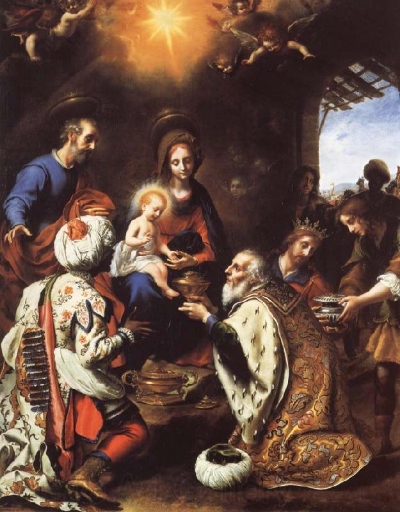Spirit-filled evangelizers!
That is what the Church and the world need: “Evangelizers fearlessly open to the working of the Holy Spirit” who “go forth from themselves… to proclaim the newness of the Gospel with boldness”, “firmly rooted in prayer”, “not only with words, but above all by a life transfigured by God’s presence.” (EG, 259)
In his “thoughts about the spirit of the new evangelization” (EG, 260) the pope speaks of “spirited” evangelizers moved by an “interior impulse which encourages, motivates, nourishes and gives meaning to our individual and communal activity” – and is capable of stirring up “enthusiasm for a new chapter of evangelization full of fervor, joy, generosity, courage, boundless love and attraction” if “the fire of the Holy Spirit burns in our hearts… for he is the soul of the Church called to proclaim the Gospel.” (EG, 261)
“Spirit-filled evangelizers pray and work”, and avoid “unilateral and incomplete proposals” only reach a few groups and “curtail the Gospel.” He calls for deep prayer, “the ability to cultivate an interior space… of prayerful encounter with the word, of sincere conversation with the Lord” lest “we lose energy as a result of weariness and difficulties, and our fervor dies out” or fall prey to “a privatized and individualistic spirituality” and use prayer as “an excuse for not offering one’s life in mission” and take “rrefuge in some false forms of spirituality.” (EG, 262)
Our evangelization models include “the early Christians and our many brothers and sisters throughout history who were filled with joy, unflagging courage and zeal in proclaiming the Gospel.” We need not say “that things are harder today; they are simply different”, but “let us learn also from the saints who have gone before us, who confronted the difficulties of their own day” as we “pause to rediscover some of the reasons which can help us to imitate them today.” (EG, 263)
Encounter your Lover… Speak of your Lover’s love!
Pope Francis speaks of the love relationship without which we can neither live nor share the Faith of the Church. Personal encounter with the saving love of Jesus is what characterizes the life and mission of the Spirit-filled evangelizer: “the primary reason for evangelizing is the love of Jesus which we have received, the experience of salvation which urges us to ever greater love of him”, the pope says. A person in love shouts it from the rooftops! “What kind of love would not feel the need to speak of the beloved, to point him out, to make him known?... If we do not feel an intense desire to share this love, we need to pray insistently that he will once more touch our hearts. We need to implore his grace daily, asking him to open our cold hearts and shake up our lukewarm and superficial existence.”
Because “‘we speak of what we have seen and heard’ (1 Jn 1:3)… the best incentive for sharing the Gospel comes from contemplating it with love, lingering over its pages and reading it with the heart”, allowing the same Gospel beauty to “amaze and constantly excite us.” A contemplative spirit will help us realize that “we have been entrusted with a treasure which makes us more human and helps us to lead a new life. There is nothing more precious which we can give to others.” (EG, 264)
Pope Francis points to Jesus as the precious mystery the human heart longs for and needs. This is the conviction which drives our evangelization efforts: “we become convinced that it is exactly what others need, even though they may not recognize it… We have a treasure of life and love which cannot deceive, and a message which cannot mislead or disappoint… It is a truth which is never out of date because it reaches that part of us which nothing else can reach. Our infinite sadness can only be cured by an infinite love.” (EG, 265)
Evangelistic conviction has to be constantly renewed by savoring Christ’s friendship and his message: “It is impossible to persevere in a fervent evangelization unless we are convinced from personal experience that it is not the same thing to have known Jesus as not to have known him… not the same thing to contemplate him, to worship him, to find our peace in him, as not to… with Jesus life becomes richer and that with him it is easier to find meaning in everything. This is why we evangelize.” He adds, “A person who is not convinced, enthusiastic, certain and in love, will convince nobody.” (EG, 266)
Do it like your Lover…
…Seek only and always the Father’s glory!
Jesus sought his Father’s glory. So must we “seek what he seeks and we love what he loves… the glory of the Father.” To this we must “commit ourselves fully and perseveringly… leave behind every other motivation… we evangelize for the greater glory of the Father who loves us.” (EG, 267)
…Know and love your people!
Pope Francis challenges us to get as close up and personal as he and Jesus get: “develop a spiritual taste for being close to people’s lives and to discover that this is itself a source of greater joy. Mission is at once a passion for Jesus and a passion for his people”, he says – reminding me of the words I, as an evangelizer, have used for many years, speaking of “My two great loves: God and people.” An evangelizer’s love for all people flows from contemplating “that Jesus’ gaze, burning with love, expands to embrace all his people” and “that he wants to make use of us to draw closer to his beloved people… He takes us from the midst of his people and he sends us to his people…without this sense of belonging we cannot understand our deepest identity.” (EG, 268)
Pope Francis states plainly that “Jesus himself is the model of this method of evangelization which brings us to the very heart of his people… contemplate the closeness which he shows to everyone! … Moved by his example, we want to enter fully into the fabric of society, sharing the lives of all, listening to their concerns, helping them materially and spiritually in their needs, rejoicing with those who rejoice, weeping with those who weep; arm in arm with others, we are committed to building a new world… not from a sense of obligation, not as a burdensome duty, but as the result of a personal decision which brings us joy and gives meaning to our lives.” (EG, 269)
…Enter people’s lives and know the power of tenderness
Don’t keep the wounded Lord at arm’s length, the pope says: “Jesus wants us to touch human misery, to touch the suffering flesh of others. He hopes that we will stop looking for those personal or communal niches which shelter us from the maelstrom of human misfortune and instead enter into the reality of other people’s lives and know the power of tenderness. Whenever we do so, our lives become wonderfully complicated and we experience intensely what it is to be a people, to be part of a people.” (EG, 270)
…Evangelize with, in, and motivated by love
Pope Francis offers us a biblically balanced approach when it comes to apologetics and catechesis in the process of evangelization. We must give reasons for our hope, but we need not be “an enemy who critiques and condemns” but “do so with gentleness and reverence” (1 Pet 3:15), “live peaceably with all” (Rom 12:18), strive to overcome “evil with good” (Rom 12:21), “work for the good of all” (Gal 6:10), and “in humility count others better than ourselves” (Phil 2:3)” – “injunctions contained in the word of God which are so clear, direct and convincing that they need no interpretations which might diminish their power to challenge us. Let us live them sine glossa, without commentaries.” (EG, 271)
…The force be with you!
So similar are several of the concepts, one could think that Pope Francis and I were brainstorming together over the past several months as he wrote this Exhortation and as I developed my latest New Evangelization Outreach Project, Remember You Are Loved, launched at World Youth Day in Rio de Janeiro, Brazil in July 2013. I’m not telling, but what I can say is this: he is on a mission of love and wants you and me to join him! What motivates and sustains our evangelization efforts is love, the force that changes everything: “Loving others is a spiritual force drawing us to union with God; indeed, one who does not love others ‘walks in the darkness’ (1 Jn 2:11), ‘remains in death’ (1 Jn 3:14) and “does not know God’ (1 Jn 4:8). Benedict XVI has said that ‘closing our eyes to our neighbor also blinds us to God’, and that love is, in the end, the only light which ‘can always illuminate a world grown dim and give us the courage needed to keep living and working’.” He calls us to “live out a spirituality of drawing nearer to others and seeking their welfare” adding that “whenever we encounter another person in love, we learn something new about God… we grow in the light of faith and knowledge of God. If we want to advance in the spiritual life, then, we must constantly be missionaries…”
“Only the person who feels happiness in seeking the good of others, in desiring their happiness, can be a missionary.” The alternative is grim: “We do not live better when we flee, hide, refuse to share, stop giving and lock ourselves up in own comforts. Such a life is nothing less than slow suicide.” (EG, 272)
Make love your joyful mission
As we see here – and as we detail at RememberYouAreLoved.com – Pope Francis is on a mission of love from above. He makes it clearer than ever before what he is about and what we must be about: “My mission of being in the heart of the people is not just a part of my life or a badge I can take off; it is not an ‘extra’ or just another moment in life. Instead, it is something I cannot uproot from my being without destroying my very self. I am a mission on this earth; that is the reason why I am here in this world.” He adds in no uncertain terms that the mission of the Redeemer ought to profoundly alter the way we see ourselves: “We have to regard ourselves as sealed, even branded, by this mission of bringing light, blessing, enlivening, raising up, healing and freeing.” He describes what the world looks like when we fully embark on this mission of love – “All around us we begin to see nurses with soul, teachers with soul, politicians with soul, people who have chosen deep down to be with others and for others” – and describes what the world looks like when we fail to do so – “once we separate our work from our private lives, everything turns grey and we will always be seeking recognition or asserting our needs. We stop being a people.” (EG, 273)
Show and tell the world that everyone is lovable and love-able.
Pope Francis is a lover of souls. Here again, his words reflect almost verbatim the first two aims on Remember You Are Loved when the pope says that “to share our lives with others and generously give of ourselves, we also have to realize that every person is worthy of our giving…because they are God’s handiwork, his creation…and he or she reflects something of God’s glory (and)…is the object of God’s infinite tenderness, and he himself is present in their lives.” Indeed, everyone “deserves our love”! And as we know from experience at Remember You Are Loved, it is possible and it is rewarding to “break down walls and our heart is filled with faces and names!” (EG, 274)
Dare to love someone new today©!
Evangelii Gaudium is a timely document. Spirit-filled evangelizers are exactly what the Church and the world need. Love makes Spirit-filled evangelization possible and delightful. Let us go out of ourselves and into the existential peripheries where so many are distant from and indifferent to God and Church. Let us dare to boldly share the love of our Lover: the One True God who has called us to be missionary disciples and messengers of love through whom He might draw all into his open side for all eternity.
Download Martha's in-depth reflection on this section at:: Evangelii Gaudium Reflection Nos. 259-274 and at http://iEvangelize.Wordpress.com.


























